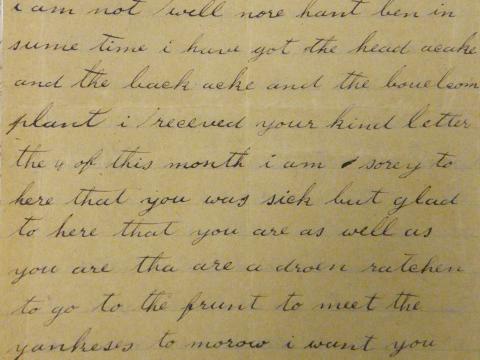
Joseph W. Wright (b. ca. 1834) was an Alamance County, North Carolina tenant farmer. He enlisted as a private in Co. G, 44th North Carolina Infantry on February 28, 1862. His service records indicate that he was hospitalized in Richmond for a gunshot wound to the shoulder on May 15, 1864 and returned to duty before November 1, 1864. Wright was captured in the fighting south of Petersburg on April 2, 1865, confined at Hart’s Island in New York Harbor, and released on June 17, 1865. At the time of the 1870 Census, Joseph Wright and his wife, Susan (b. ca. 1832), were still living in Alamance County.

Wilburn Thompson (b. ca. 1825) was a Milton County, Georgia tenant farmer. At the time of the 1860 Census, Thompson and his wife Charlotte “Lottie” (b. ca. 1830) had three children (another was born in 1864). According to the census, Thompson and his wife could not read or write, so others wrote his letters for him. Wilburn Thompson enlisted as a private in Co. G, 56th Georgia Infantry in the spring of 1862. He was wounded and taken prisoner at Dalton, Georgia and died at Camp Morton, Indianapolis in August 1864.
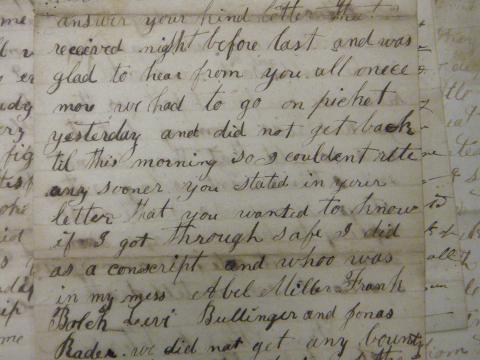
John Peterson (b. ca. 1821) was a Catawba County, North Carolina farmer and gunsmith. At the time of the 1860 Federal Census, Peterson and his wife, Hannah (b. ca. 1820) were living in the Hickory Tavern neighborhood of Catawba County with their eight children. His son, Peter J. Peterson (b. ca. 1846), enlisted in the 28th North Carolina Infantry on March 1, 1864 and died of wounds on May 20, 1864. John Peterson joined the 28th North Carolina on October 28, 1864. He was captured at Petersburg on April 2, 1865 and confined at Point Lookout, Maryland before being released on June 16, 1865. There are letters from John and Hannah Peterson and from Peter J. Peterson, as well as from relatives serving in the 22nd North Carolina Infantry.
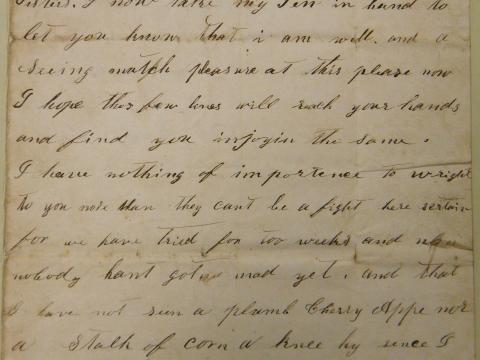
The Talton family (also spelled Tarleton) owned a small farm in DeKalb County Georgia. William E. Talton (b. ca. 1844) was the son of Martin P. and Amanda Talton. William mustered as a private in Co. E, 7th Georgia Infantry on May 29, 1861 and died of disease in Richmond on September 20, 1861.
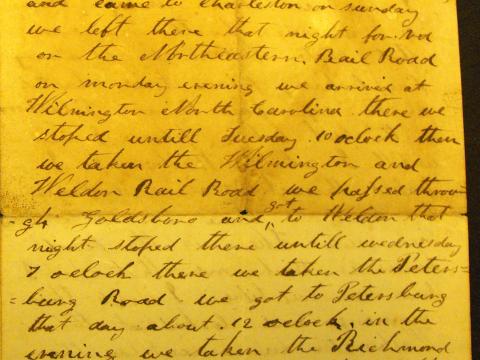
Joseph A. Drummond (b. ca. 1831) was a farmer from Barnwell District, South Carolina. He served as a private in Co. G and Co. E, 1st South Carolina Infantry (Hagood's). At the time of the Federal Census of 1860, Drummond and his wife, Martha (b. ca. 1830), had two children, James (b. ca. 1856) and Susan (b. ca. 1858). Martha and the children appear in the 1870 Census but Joseph does not. In the 1880 census, Martha is marked as widowed. His military records indicate that he was wounded at Second Bull Run on August 30, 1862, then taken prisoner and paroled at Warrenton, Virginia on September 29, 1862.
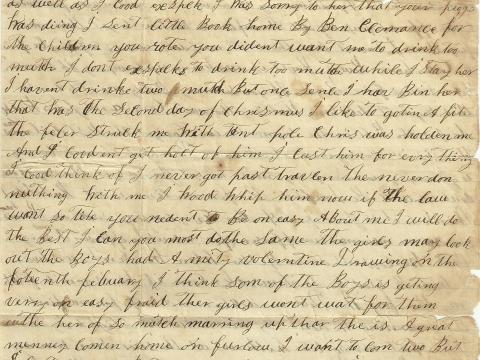
John B. Gregory (b. ca. 1830) was a farmer from Pittsylvania County, Virginia. At the time of the 1860 Census he resided on his farm with his wife, Martha (b. ca. 1833), and their four young children (ages 1-5). J. B. Gregory enlisted in Co. B, 38 th Virginia Infantry (the “Pittsylvania Regiment”) on July 10, 1861 and was killed at Gettysburg on July 3, 1863, when his regiment took part in the assault on Cemetery Ridge. During the battle more than half of the 400 men of the 38 th Virginia were killed, wounded, or captured. The letter appears to have been written for Gregory (see last line of page 10). John Eanes was the Gregorys’ next door neighbor in the Swansonville neighborhood of Pittsylvania County.
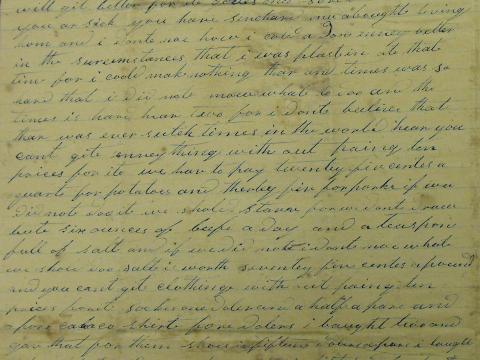
Solon L. Fuller was born in New Jersey ca. 1800. At the time of the Federal Census of 1860, Fuller was living in Randolph County, Alabama with three teenage sons. His occupation was listed as “mechanic,” but the family apparently farmed as well. In the early 1860s Solon Fuller remarried and by 1862 was serving in Croft’s Battery, Georgia Artillery (AKA the Columbus Light Artillery). Fuller’s two oldest sons, Phillip (b. Alabama ca. 1842) and Sidney (b. Alabama ca. 1844) served as privates in Co. E, 5th Battalion (Cavalry) of Hilliard’s Alabama Legion. When Hilliard’s Legion was disbanded, the 5th Battalion became part of the 10th Confederate Cavalry. Solon Fuller’s youngest son, John (b. Georgia ca. 1837), also served in the Confederate Army. Solon Fuller and his son Sidney both died during the war.
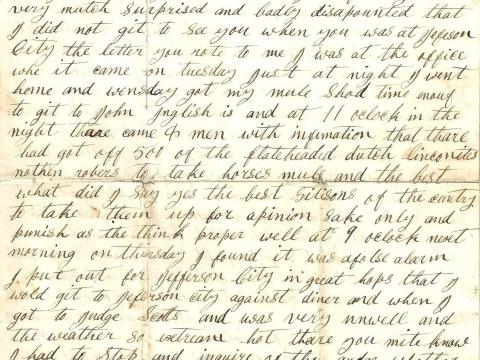
Coleman Bruce (1802-1885) was a native of Campbell County, Virginia. In the 1830s he moved his family to Missouri and settle near Jamestown in Moniteau County, where he became a successful farmer and wealthy land (and slave) owner. His letter is addressed to his daughter and son-in-law and was written ten days after the Battle of Wilsons Creek. His son-in-law, William Jackson, served as an officer in the Union Army. The Judge Scott mentioned in the letter was Chief Justice of the Missouri Supreme Court in 1852 when he was involved in the Dred Scott case. The Bruce letter reflects the conflict between Southern sympathizers in Missouri and pro-Union German immigrants who resided in the state.
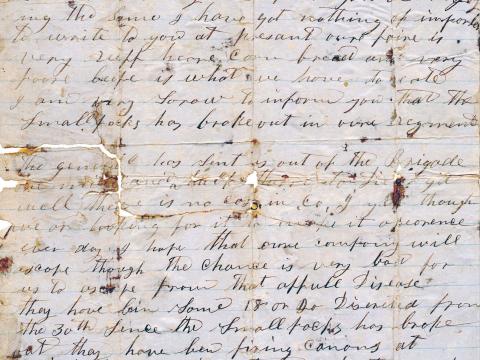
Isaac B. Coleman was a farmer from Talladega County, Alabama who mustered into service as a drummer in Co. I, 30 th Alabama Infantry on March 22, 1862. The non-standard spelling, lack of punctuation, and erratic capitalization is typical of individuals, North and South, whose access to schooling was limited. The variant past tense drawed was widespread in 19 th -century American English, as was haint for have not or has not and was with a plural subject (I Dont no what they was firing at). The pattern of subject-verb agreement which allows a plural or compound noun subject with is (corn bread and very poore beefe is what we have to eat) was widespread in the Midlands and South. Features which are more specifically Southern include sorrow as an adjective (I am very Sorow) and the phonetic spelling cear for care (I have ben a little cearless about riting).
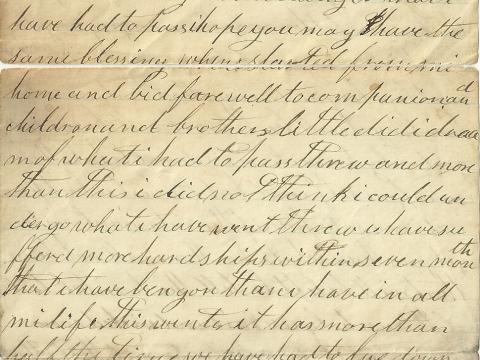
Christopher Van Loon (b. ca. 1818) was a farmer from Schuyler County, New York. He enlisted as a private in Co. H, 107th New York Infantry on August 4, 1862 when he was 44. Van Loon’s letter is typical in the lack of punctuation, non-standard spellings, and eccentric capitalization. As with many other letter writers, he commonly confuses the spellings of homophones (close/clothes, threw/through, tail/tale, our/hour, wood/would). However, Van Loon is fairly articulate and there is little in his letter that would suggest a particular region of the country.
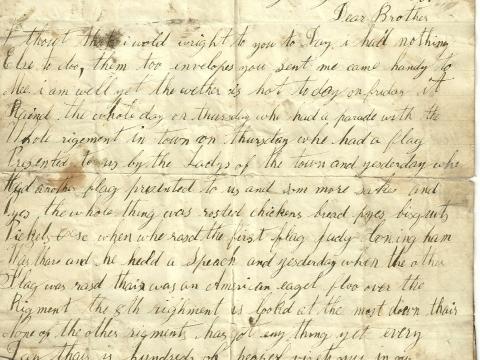
Frederick Andrea was from Luzerne County, Pennsylvania (the family name is also recorded as Andrie, Andres, and Andreas). On April 23, 1861, Andrea mustered into service as a musician in Co. G, 8 th Pennsylvania Infantry, a three-month regiment that performed guard duty along the Potomac before it was mustered out on July 29, 1861. Despite noting that he did not intend to serve longer than three months, he enlisted in Co. I, 98 th Pennsylvania Infantry on August 23, 1861. He was wounded at the Battle of Cold Harbor on June 3, 1864 and was discharged at the end of his enlistment on September 5, 1864. Frederick’s younger brother, Jacob, mustered into service with the 9 th Pennsylvania Cavalry in May 1864 and mustered out in July 1865. Frederick Andrea’s German ancestry comes through in some of the language of the letter.
We are sorry to report that Private Voices co-director Michael Montgomery passed away on July 24 at the age of 69.
Private Voices has been updated with more than a thousand letters from four Northern states: Maine, Massachusetts, Pennsylvania, an
Private Voices has been featured in Slate after the discovery of the phrase "kick ass" in one its featured letters.
Private Voices has launched! Here is the official press release:
The Corpus of American Civil War Letters Project (CACWL), which we also call "Common Tongues," is a collection of thousands of letters written by Civil War soldiers who wrote "by ear." Instead of writing grammatically-correct English, these "transitionally literate" men used the alphabet to capture the sounds words made when they spoke them. The letters have been painstakingly collected by Professor Michael Ellis of Missouri State University, and the result is a linguistic bonanza: a body of evidence that captures the dialect and pronunciation of the under-educated classes of the Civil War generation. The CACWL is a bonanza for historians as well. Almost all of these men were army privates, and their letters reveal a great deal about the lives and motivations of the Civil War's common soldiers. Ellis has also produced a new book devoted to the collection's North Carolina soldiers and their usage of English.

eHistory was founded at the University of Georgia in 2011 by historians Claudio Saunt and Stephen Berry